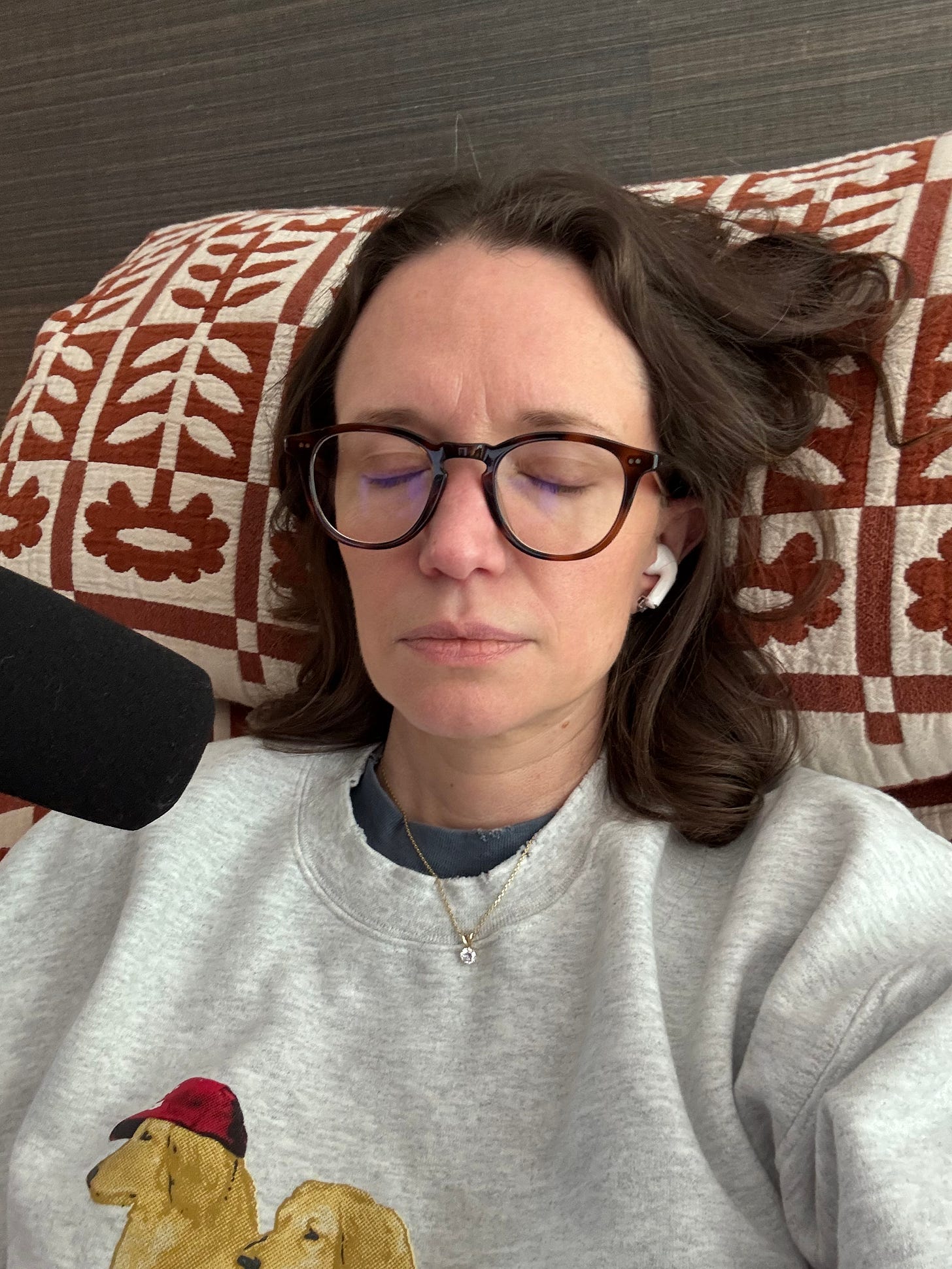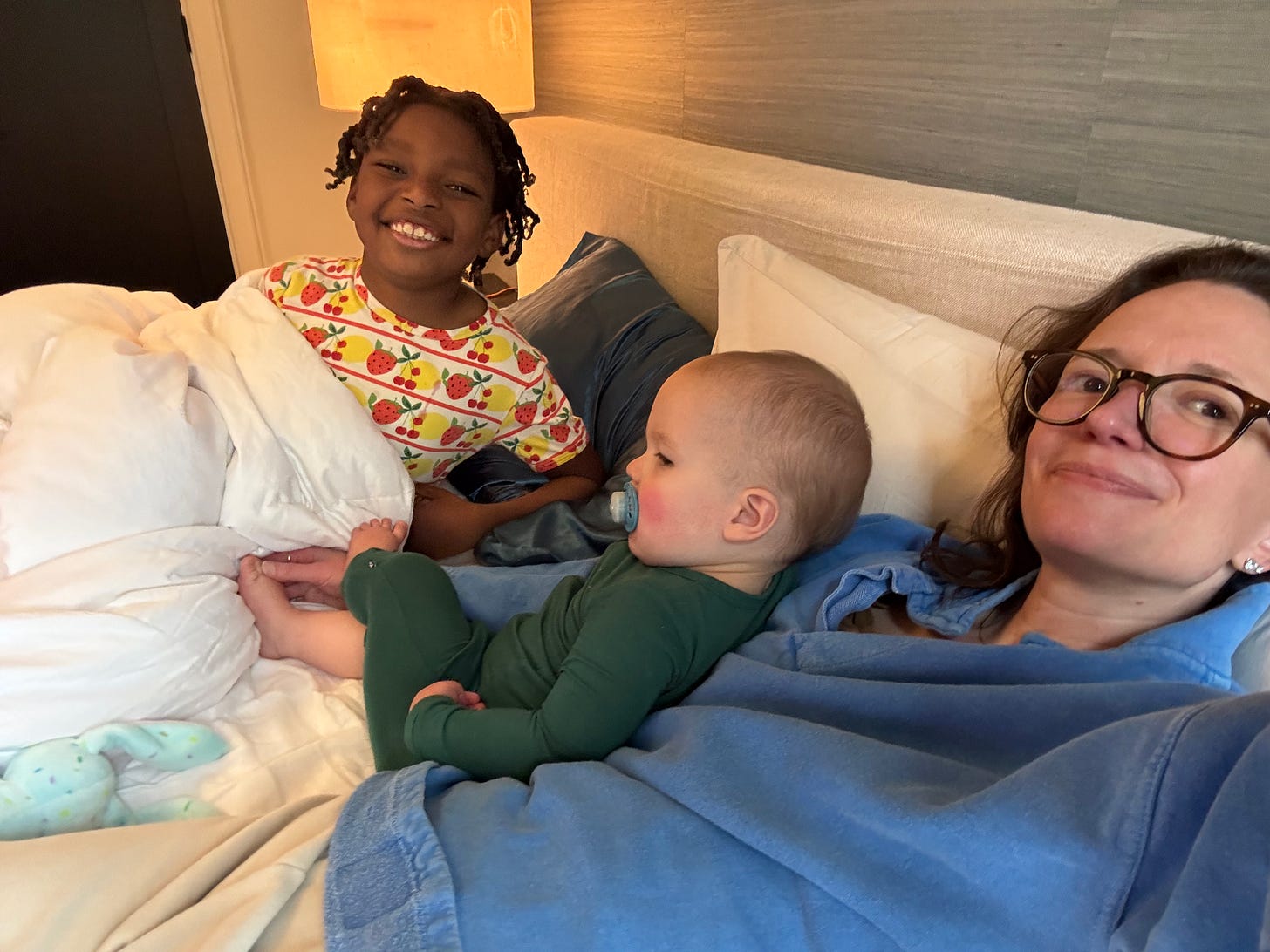You can order Unfit Parent here. And I would like that very much.
An added benefit of having a hearing aid is that you are always wearing very expensive AirPods, paid for by insurance. My hearing aid can play music, podcasts, and acts as a teeny tiny phone. About two months ago, it broke, and I am waiting for the repair. Not only am I less pleasant to have a conversation with now (can you repeat that?), but I now need to wear actual AirPods when talking on the phone, listening to a podcast, or, as is often the case recently, recording an interview.
My floppy EDS jaw does not like having something the size of a lima bean in my ear (my hearing aid is the size of a pea), and when I wear Airpods too often, I get TMJD symptoms. The symptoms were mild until two weeks ago, while on a call with a producer. As she was talking, I felt my right jaw throw in the towel. My eye started twitching, and the muscles from the top of the head to the middle of my back seized up. I quietly removed my AirPods and started massaging my face, but the damage was done.
That muscle spasm triggered a three-day migraine, which has now evolved into chronic and distracting nerve and muscular pain in my face, neck, head, and back.
I rarely talk or write about my pain (maybe I’ll spend a newsletter working out why), but it is part of every minute of every day of my life. I hurt when I wake up, when I try to fall asleep, and when I wake up to pee at 1 am. I chase each ache around my body with heat and ice and little massages, but it is always one step ahead of me. This is the hand I’ve been dealt.
Also, that is not the only way my body suffers. When Manitoba’s wildfire smoke blew in last week, the poor air quality triggered symptoms that I call “episodes.” When I have an episode, I wake up with the certainty that something is very wrong. My skin prickles, I have waves of nausea, I’m hot and cold, and my heart races. They can last from 1 to 30 minutes, and when they depart, I am left trembling for an hour or so. I hate them. They have landed me in the hospital. Episodes reduce me to pure, agonizing sensation. When I’m in the middle of one, I wonder if I can bear it.
I’ve been thinking a lot about physical suffering. It’s three-dimensional. There is the actual pain or discomfort, and then there is the memory of past pain. There is the fear of future pain. There is self-blame for ways you could have prevented it. There is anger at those who have exacerbated it.
Dianna Cowern is a successful and charismatic physics YouTuber who developed Long Covid and ME/CFS after catching Covid in 2022. Her symptoms worsened until, for one full year, she was in such physical agony that she couldn’t speak, listen to music, or even wear clothes.
She recently posted a video with updates. She is improving. She can walk around her apartment. She can watch a movie. She can speak with her husband. I cried when I saw her incremental improvements. What tremendous capacity these bodies have for pain and for hope.
The New York Times recently published a reported piece on Canada’s policies on physician-assisted death (called MAID). I clicked on the link because, ever since the legislation changed here, giving those with non-terminal illnesses access to physician-assisted death, I’ve worried about the implications for disabled people. With inadequate accessible housing, disability income, and personal support, disabled people see death as the only way out of the unsolvable problem of staying alive.
I was floored that the physician profiled in the piece was our family doctor from when we lived in Kingston. I was taken in by the story of Paula Ritchie, who died at 52, by lethal injection (given by my former doctor). Paula’s life was delineated by pain, mental and physical. She experienced abuse. When she decided to die, she wasn’t out of options, but the hand she had been dealt had exhausted her inner resources. She simply could not go on.
Again, there is so much pain in our lives.
A few weeks ago, I stayed up late reading Archie Bland’s Guardian essay about his son, Max. At 6 weeks old, Max stopped breathing in his sleep. The minutes after Archie and his wife Ruth woke up to a lifeless version of their son and scrambled to save his precious life are viscerally horrifying, mainly because they are every parent’s nightmare: I have spent years watching my children breathe at night.
Max survived and is now disabled. His dad writes about how they have suffered and changed. I have scrutinized physical frailty in similar ways and have reached a conclusion similar to Archie’s:
But if the question is whether I would take myself back to being the genial ignoramus of two years ago, I’m much less sure. I wish this had never happened, of course. But life would feel thin without it. I understand things about myself and the world now that I can’t wish I didn’t know. All of the noise about what on earth I’m here for has melted away. I think I am a better person, if a sadder one.
There is a 2013 New York Times essay on suffering by Pico Iyer that Dr. Shear, my former mentor and current friend, shared with me. I’ve read it probably twenty times. Every time I read it, a new insight rings true. This month it’s this line:
Death undoes us less, sometimes, than the hope that it will never come.
David and I talked about non-terminal MAID the other night. He was for, and I was against (painting with a very large brush, here). I argued that disability and physical weakness elicit such an unconscious bias in society that it skews our sense of what is ethical. What if a person were lonely? Or grieving? Or purposeless? How would we feel about a doctor assisting those deaths? Those states can bring tremendous, relentless suffering, but it’s hard to imagine life-ending treatments being legislated.
How do we rank suffering? Should we? Obviously, there are lives marked by more agony than others, but the forms that our pain can take are innumerable. Apples to oranges. And then, of course, there are the mitigating factors: money, social supports, hope.
I wind myself in knots and always come back to the same thing. There is a razor’s edge where we can balance and access what feels to me like a/the deep truth: we hold the cool, damp cloth of relief over our suffering and that of others, we know we will not prevail, and we allow that fated failure to change us.








Thank you for sharing this, Jessica. This is a really helpful and poignant piece.
Thanks for sharing this, Jessica. <3